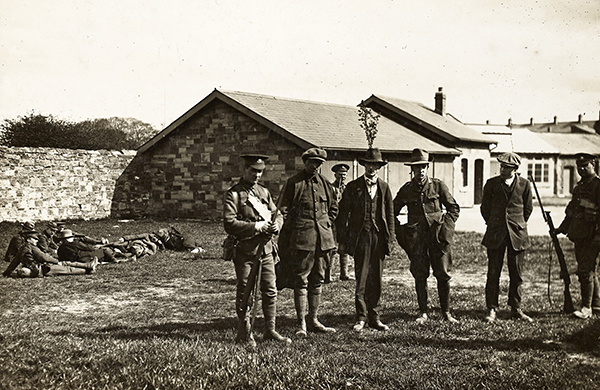KINDRED LINES
Published in Features, Issue 3 (May/June 2016), Volume 24The Irish National Aid and Volunteer Dependants’ Fund
By Fiona Fitzsimons
The WO35 records featured in the previous issue tell the story of how the Irish population, initially hostile to the rebels in 1916, were alienated by the authorities’ heavy-handed response. The records of the Irish National Aid and Volunteer Dependants’ Fund (INAAVDF) complete the second part of that equation. They describe the process by which, between 1916 and 1918, the Irish people sympathetic to the plight of the families and dependants of rebels killed or imprisoned began to organise through work and donations to provide basic financial support.

Above: Rebel prisoners under guard at Richmond Barracks, Monday 1 May 1916. (NLI)
In the first two years of its existence the INAAVDF collected and paid out £134,520 to rebels’ families. It created a parish network of support and solidarity for the Rising. Through their own endeavours, the workers and contributors to the fund came to identify with the aims and objectives of the rebels. The original idea for such a fund was set out in 1909 by Bulmer Hobson in his pamphlet Defensive warfare. Hobson argued that any successful insurgency required a ‘community of interest’ to provide financial support for dead or imprisoned rebels and their dependants. In late 1915 the idea was revived, and An Cumann Cosanta was briefly established with Eoin MacNeill’s support. The Volunteer split at the time of the Rising terminated this first attempt to provide a relief fund.
As the awkwardness of the organisation’s name suggests, the INAAVDF was established by merging two earlier groups. In May 1916 the Irish Volunteers’ Dependants’ Fund (IVDF) was established as a charitable appeal to evade the censor. Its aim was ‘to provide adequately for the dependants of the men executed, killed in fighting, imprisoned or deported for their participation in the insurrection …’. The fund’s bedrock was £3,100 in gold, sent in advance of the Rising by Clan na Gael supporters in the US but never spent.
In May/June 1916 the Irish National Aid Association (INAA) was established ‘to provide for … the relatives of imprisoned men, or the families of the sentenced dead’. It was supported by the Catholic Church, the Dublin Trades Council and prominent members of Dublin Corporation. The INAA issued an appeal for subscriptions through the Irish Independent, which subsequently published receipts of monies received, indicating how branches were founded at parish level across Ireland and the success of their appeal to the diaspora.
In August 1916 these two organisations merged as the INAAVDF. Unusually for any collection of Irish historical documents, the records survive in their entirety and are held by the National Library of Ireland. Records of interest to family or local historians include the following.
- Lists of dependants of persons killed, wounded or taken prisoner during the Rising in receipt of aid (NLI MS 24,362).
- Four large ledgers with two index volumes, containing lists of people in the Dublin area in receipt of weekly grants, 1 July 1916–18 May 1918 (NLI MS 23,487–492).
- Three cash books, which include names and addresses of subscribers, 23 May 1916–27 July 1919 (NLI MS 23,482–484).
- Overseas subscriptions collected from 1916 to 1919. Most of the subscribers are in the US and the UK, but donations also came in from Australia, Canada, South Africa and Bolivia (NLI MS 24,385).
- A list of people ‘who lost their employment following the Rebellion’ and small grants to assist them in establishing new small businesses (NLI MS 24,334).
The INAAVDF records are an essential source for anyone tracing rebel ancestors. In a very practical way, these records also show how nationalist feeling grew and was consolidated among the Irish people in 1916–19.
Fiona Fitzsimons is a director of Eneclann, a Trinity campus company, and of findmypast Ireland.
FURTHER READING
A. Matthews, Renegades: Irish Republican women 1900–1922 (Cork, 2011).
















